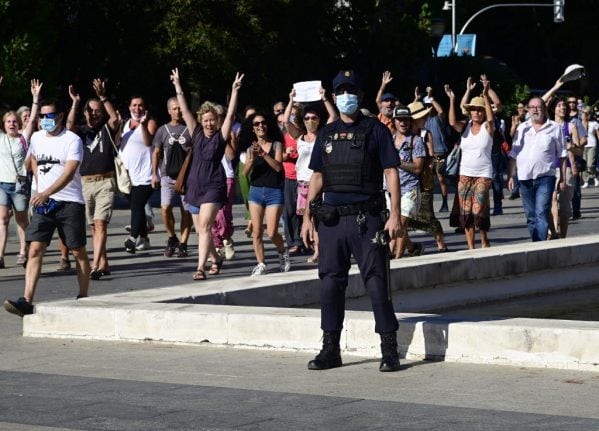A crowd of clapping and cheering people gathered beneath an enormous yellow and red Spanish flag that stands in the Plaza Colon in the centre of the city in response to calls on social media.
Protesters held up home-made placards featuring slogans that included “The virus does not exist”, “Masks kill” and “We are not afraid”.

The demonstration drew a variety of attendees, including conspiracy theorists, libertarians and opponents of vaccination.
Pilar Martin, a 58-year-old housewife from the northeastern city of Zaragoza, said she had come to Madrid for the rally because she believed governments around the world were exaggerating the number of infections to curb people's freedoms.
READ MORE:
- Spain reports almost 3,000 coronavirus cases in just the last 24 hours
- Smoking ban extended to whole of Spain and nightclubs to close
- Catalonia extends public drinking ban for another two weeks

“They are forcing us to use a mask, they want us to stay home practically locked up. It's obvious that they are continuously tricking us with talk of outbreaks. It's all a lie,” she told AFP at the rally.
A number of participants cited a slickly edited documentary dubbed “Plandemic” which has been removed from several social media platforms including YouTube and Facebook because it was found to have false claims, such as that wearing masks can cause harm or that vaccines have “killed millions”.

Many protesters did not wear a mask even though it is required by law in public across Spain, which has seen a surge in new infections since it lifted its three-month lockdown measures on June 21st.
WATCH VIDEO:
Mask-wearing was initially imposed in early May as a requirement for those using public transport, and was later expanded in a country where the virus has killed nearly 29,000 people.
The protest comes two days after the government announced new restrictions to curb the spread of the virus, including the closure of discos and a ban on smoking in public areas when it is not possible to keep at least two metres from other people.




 Please whitelist us to continue reading.
Please whitelist us to continue reading.
Thank you for reporting this but, once again, there is no distinction between the (very unreliable) positive test results and the number of people who are actually ill or even have any symptoms.
Furthermore, I believe the official estimate of the number of protesters in Madrid was in the region of 2,500, not just hundreds.
Finally, mask-wearing can harm people’s health and that is not a false claim.